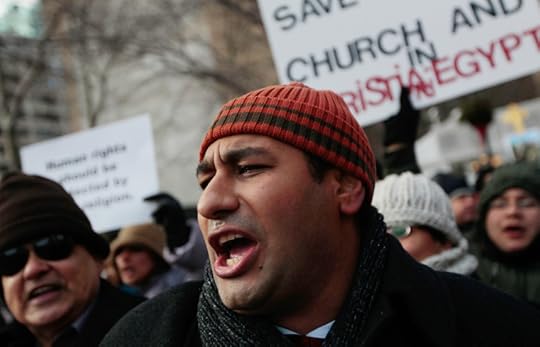Daniel Darling's Blog, page 55
March 20, 2015
The Church As the Answer for Loneliness
We are be the most connected generation ever, with no shortage of ways to communicate with our fellow man. And yet, we may be the most isolated, individualistic generation ever. In some ways, Facebook, Twitter, IM, texting–has brought us closer together. And in other ways it’s kept us apart.

I talked about this interesting paradox with Erin Davis, author of an important new book, Connected. Here is one of the questions I asked her:
How can the Church provide answers for loneliness? Can an overemphasis on a “personal relationship with Christ” undermine our God-given need for community?
I believe the church holds the only vaccine to our lonely problem. But sometimes, our Christian communities elevate a solitary faith. God is supposed to be all we need after all, right?
I call it the Patmos Syndrome. We elevate John, isolated on the island of Patmos, as somehow more holy or more spiritual than John when he was part of a pack of disciples. We hold high those saints who go at it alone and willingly choose isolation for the sake of the kingdom.
But what if we’ve got it all wrong? What if God wanted us to be connected to others so much that he hardwired the craving to connect into our very DNA? The church needs to be teaching something that we see clearly in Scripture, mainly that we need each other. There is accountability, support, wisdom, and strength to be found in choosing to weave our lives into the lives of others.
For community to really take root, the church also must make peace with the messiness of life. If we feel we can only come to church as the best version of ourselves without sin or issues or fears, true connection will not happen. The Gospel draws people to churches, once they are there churches need to find ways to connect people with each other. This doesn’t have to be highly programmed but it can be. I think the churches that are doing it best have an overt culture of “we need each other here.”
You can read the rest of the interview here:
March 19, 2015
The Way Home – Episode 10 featuring Mollie Hemingway

My conversation today is with Mollie Hemingway, a popular and fierce journalist. Mollie is a senior editor at The Federalist where she is unafraid to challenge conventional thinking in the media and in politics. Her work has appeared in the Wall Street Journal, USA Today, the Los Angeles Times, the Guardian, The Washington Post, CNN, National Review, GetReligion, Ricochet, Christianity Today, Federal Times, Radio & Records and many other publications. Mollie was a 2004 recipient of a Phillips Foundation Journalism Fellowship. I talk to Mollie about her pathway into a journalism career, how her Christian faith informs her work, and what advice she might have for young journalists wanting to get their start in this industry.
Listen to this week’s episode of The Way Home
Show Notes
Follow Mollie on Twitter: @mzhemingway
Check out Mollie’s work at The Federalist
March 13, 2015
Teens and Screens: Advice for Parents
As a father of four children under ten, I am constantly thinking about our kids’ interaction with technology. On the one hand, I want them to be read and equipped to leverage technology to fulfill their God-given mission in this age. On the other hand, I see technology as a kind of loaded weapon that can be used by the enemy to destroy their souls. This is why I really appreciate people like Dr. Kathy Koch, who has thought deeply about this. She’s got a new book out, Screens and Teens. I had the chance to chat with her for Leadership Journal this week. Here is one question I asked:

I think a lot of Christian parents are wrestling with the tension of using technology for good and also protecting their kids from potentially harmful content. How can they navigate this tension?
We certainly need to parent by faith and not by our ability to protect our kids. Relying on Godly wisdom, parents can begin equipping their children from the time they’re young to make wise choices, so they get to practice making good (and poor) choices while the stakes are low. Children with good decision-making skills can help protect themselves by choosing to avoid certain games, websites, movies, and the like. Being able to discern good from evil also prepares them to quickly turn away from and delete harmful content they do come across.
I want to remind parents that it’s equally important that they personally model healthy uses of technology—in terms of what devices they use, why, when, and how often. You can introduce your kids to the learning potential of specific sites and devices as well as the fun we can have individually and together. Modeling healthy technology use is one part of the equation. The other side is accessing parental control services to protect children from stumbling on to harmful material.
You can read more here:
March 12, 2015
The Way Home – Episode 9 featuring Lee Strobel
Lee Strobel is a man who needs little introduction. Once a skeptic, the award-winning legal journalist for the Chicago Tribune found Christ after weighing all the evidence. He’s spent the last several decades as an eloquent apologist for the the Christian faith, with classic books like, The Case for Christ . But recently Lee’s life took a frightening turn when he was faced with a threatening illness. It caused him to question his faith and everything he knew. What emerged was a fresh appreciation for grace.
. But recently Lee’s life took a frightening turn when he was faced with a threatening illness. It caused him to question his faith and everything he knew. What emerged was a fresh appreciation for grace.

Today I talk to Lee about this crisis of faith, about his journey to Christ, and the incident with Chicago Cubs’ rookie outfielder Ernie Banks that made him a lifelong Cubs fan.
Listen to this week’s episode of The Way Home
Show Notes
Twitter: @leestrobel
Website: www.leestrobel.com
Book: The Case for Grace

Also: a reminder this is the last week until registration closes for the 2015 ERLC Leadership Summit on “The Gospel and Racial Reconciliation,” go to erlc.com/summit2015. When registering use coupon code: WAYHOME for a 15% discount. This event will be held in Nashville on March 26-27, 2015.
March 9, 2015
The Surprising Advice Max Lucado Gives to Young Pastors
Max Lucado has been one of the most popular evangelical leaders for many years. His books have sold in the millions and are a regular fixture on the bestseller’s list. I had the chance to interview Max for my weekly blog with Leadership Journal. As with all interviews, this one had to be trimmed for publication. Leadership Journal featured the questions I asked Max about his new book on prayer. But I also asked him about his hopes and concerns for the evangelical movement and the surprising advice he gives to young pastors.

What excites you about where the evangelical Church is today compared to where it was when you began your ministry?
Well, I think there are some wonderful branches of the church that are just making phenomenal progress that are growing all over the world, different movements within the church: healthy movements. I am very encouraged about that. I am really encouraged about our commitment to compassion. The groups like World Vision, like Compassion, like Feed the Children, like Samaritan’s Purse, these are very viable, wonderful ministries of the church today. They seem to be being very well received around the world and there are so many of those. So, I think that the number of church plant movements that are happening, as well as our compassion movements, these are reasons for us to be very encouraged.
What concerns you, if you have any?
Well, I’m not sure that we quite know how to behave in our society as the Church, definitely in this post-Christian era. I think the Church itself hasn’t quite learned how to interact with the government. We have for so many decades assumed that the government was going to re-enforce the values of the church. Now that we are seeing a change happening, literally daily, from one value to the next, we are not quite sure how to behave. I think we will pass through a time of confusion, but I am really thinking that at some point we are going to realize that the Bible was written for times like these.
The Bible was written for people who were living in places where Christians were the minority and sometimes maybe quite often the persecuted minority. So we are going to be able to see, oh, the Bible was written for people like me. When Paul was writing the letter to the Roman Church, he wasn’t speaking to a church that was accustomed to having prayer in schools or having their values re-enforced. So when he said to pray for the leaders, he was talking about praying for people who were antagonistic to your way of thinking, to your value system? So, I think we will come out stronger on this but I think we are going to have to learn some things about living in a culture that seems to be antagonistic toward our values.
It seems that this is a time really for the church to be distinct and kind of live out our status as sort of sojourners and exiles as Peter talks about.
Exactly. My only concern is when I see Christians begin to freak out and get angry and be antagonistic. We have this attitude that the devil is in Washington, that everything is going over the edge of the cliff, this total utter despair. I have trouble reconciling that with the belief in a sovereign God who is sitting on the throne, who oversees affairs of humanity, who places kings on thrones and removes kings from thrones. That is the God we serve. Well, let’s be people of peace and trust that, yes, we are in a different era and that’s okay. God’s not baffled so let’s just keep trusting him.
You’ve been in ministry for a while now, and what are the keys to sustaining ministry for the long haul?
Well, I think I have an answer that is really going to surprise you. But I think the day you begin your ministry, you should start thinking about a succession. I think our tendency is to build churches that depend upon our presence, and that’s not healthy. We all know churches, healthy churches, which have really struggled when the senior leader had to, for whatever reason, leave. I remember many years ago a man by the name of Lyle Schaller who wrote quite a few books on church growth many years ago. He came to see me one day and his first question was: “If you were to get hit by a bus, would your church survive?”
It was not a great way to start a conversation but I didn’t have a good answer to that question because I had absolutely no planning for somebody to take over if something were to happen to me. I think it’s good stewardship for us to begin considering succession the day we begin the ministry; to begin working ourselves out of a job. That forces us into a posture of discipling others, thinking long term, and it also helps the church to transition, because the truth of the matter is, things could happen to the senior leader. God might call me to leave somewhere and go somewhere else or a bus could hit me, so I think that the thing that is too seldom discussed among church leaders is a succession plan.
It takes a bit of humility to say, hey, I guess I’m not the answer to everybody’s needs.
Exactly, and what I found out is that I kind of liked the church depending on me. I kind of take pride in that. It’s not very healthy, is it? So what we’ve done at the church in San Antonio is we’ve put in place Randy Frazee, who has been with us now for seven years, and he is now the senior minister, and that means that all of his staff and all of the budget issues land on his desk and not mine. We split the preaching 50/50.
Since he is younger than I am by almost a decade, and so I feel like the church is in good hands. As I get older, if and when I have to leave or the Lord calls me home, we have a strong succession plan already in place and I feel very good about that. It brings me great peace. At times it is difficult, you know, giving up responsibility. And I’ve got to say there were other times, it was a joy to give up those responsibilities.
Why is it that it just seems very few of those transitions go well in large churches and Christian organizations? Why is there so much ugliness with passing the baton?
It does. I think that, here’s my hunch. I think the same personality that can build a large healthy organization has trouble relinquishing that organization. Does that make sense?
Yes.
The very traits that cause you to be able to attract a large number of people and build a sophisticated or strong organization, it is a high sense of loyalty to that organization so there is a feeling like I’m betraying my organization if I turn it over to someone else. This is just a hunch that I have and may not be right, but I do see many, many strong leaders neglect to prepare for the next generation in their organization and their church suffers as a result.
You can read the rest of my interview with Max here:
March 5, 2015
The Way Home – Episode 8 featuring Jayson Casper

All of us have reacted with horror at the atrocities committed by the terrorist group ISIS upon Christians in the Middle East. How can Christian pray? How should we think about ISIS?
Today on The Way Home I talk with Jayson Casper, a Christianity Today journalist who has been covering this story. He called me from Cairo to discuss how Christians in places like Egypt, Jordan, and other countries are reacting to the atrocities of their brothers and sisters in Syria and Iraq and Libya. He also gives a thorough analysis of ISIS and Islamic extremism.
Listen to this week’s episode of The Way Home
Show Notes
Twitter: @jnjcasper
Read Jayson’s work at Christianity Today
Also: a reminder that we have one more week until registration closes for the 2015 ERLC Leadership Summit on “The Gospel and Racial Reconciliation,” go to erlc.com/summit2015. When registering use coupon code: WAYHOME for a 15% discount. This event will be held in Nashville on March 26-27, 2015.
February 28, 2015
2016 and the Imago Dei
I had the opportunity to blog over at Huffington Post today on 2016 and a fundamental question I hope the candidates are asked:

But if we are going to have questions about the questions directed at presidential candidates, I’d like to offer one a query I hope every aspirant is asked. It’s a simple question that has profound policy implications.
Do you recognize the intrinsic value of every human life, from conception to natural death?
For Christians, this question is rooted in a foundational belief. The Christian story starts in Genesis with the declaration by God that humanity, unlike the rest of creation, was sculpted by a loving and creative God and formed, “in His own image.” The Latin word is imago dei. Christian theology teaches all humanity was endowed with dignity because we are made in God’s likeness.
It is this theology that drives what Christians believe about the basic dignity and worth of every human being. In every person, regardless of their utility to society, we see the image of God. This drives our activism on issues like abortion, immigration, human trafficking, poverty, racial reconciliation, elder care, orphan care and advocacy for the disabled. It’s why we care about the institution of marriage, because we believe that God’s best design for human flourishing is the complementarity of the sexes. It’s why we care about religious liberty, because every soul has the right to worship freely, even if we believe they are wrong.
Read the rest here:
February 26, 2015
The Way Home – Episode 7 featuring David Prince
Today I am joined by Dr. David Prince. We’ll be talking on various topics such as diversity in the church and the role of sports and faith in parenting, life and church.
Dr. Prince is the pastor of preaching and vision at Ashland Avenue Baptist Church and a professor of Christian preaching at the Southern Baptist Theological Seminary. He is a regular contributor to ERLC. Here are some of his most popular articles.
Twitter: @davideprince
Website: davidprince.com
To learn more about the 2015 ERLC Leadership Summit on “The Gospel and Racial Reconciliation,” go to erlc.com/summit2015. When registering use coupon code: WAYHOME for a 15% discount. This event will be held in Nashville on March 26-27, 2015.
February 21, 2015
Finding God in the Darkness
Praising God when everything is going well–that’s one thing. But what about praising God, or even finding God, when life gets dark. Let’s face it, if you’ve lived long enough you’ll experience seasons of crushing, hopeless despair and wonder where God is in the midst of it. That’s why I’m glad to see AJ. Swoboda’s new book Glorious Dark, address this issue. I had the chance to interview him this week:

So most people picking up this book would find the two words of the title: Glorious and Dark to be incongruent. And yet you seem to make that case that there can be glory in the darkness of life. How so?
In the Bible “darkness” is an important image a serious reader can’t overlook. We find that the Hebrew term for darkness, arafel, is mentioned 15 times throughout the Hebrew Scriptures. Oddly enough, over half of such references are directly connected to God’s presence. For example, we find this interplay in Exodus 20:21 when Moses enters into the arafel, the darkness, and within, meets with God. Oftentimes darkness is indicative of God’s presence—God is in the arafel.The image rolls out even more in the New Testament. Jesus laid in a tomb of darkness on Holy Saturday. Yet within that penetrating darkness, a glorious resurrection would take place. It is true: “in God there is no darkness at all.” (1 Jn. 1:5) But the opposite isn’t true; God can enter the darkness and break through its hollow trappings. In anyone’s life, there are many things that seem hard, challenging, and “dark.” But the good news is that there, in the darkness, resurrection can happen.
Read the rest of the interview here:
February 20, 2015
The Way Home – Episode 6 featuring Brian Ivie
I am very excited about today’s interview with my friend Brian Ivie, director of the movie, The Dropbox. I encourage you to go see this movie. It is being released as a special theatrical event March 3-5.
What’s interesting about this movie is not only the story of South Korean pastor Lee Jong-rak and his efforts to save babies in South Korea, but Brian’s own story in coming to faith in Christ while producing the movie.
Websites: thedropboxfilm.com and arbellastudios.com
I also briefly mentioned an event we are working on with Focus on the Family , “Evangelicals for Life” to be hosted in Washington, D.C. next year around the March for Life. We’re still working on the details for this, but for some early information, you can check out the website: evangelicals.life.
You might also be interested in our Psalm 139 Project, where gracious donors give funds for ultrasound machines to be placed in crisis pregnancy centers.
To learn more about the 2015 ERLC Leadership Summit on “The Gospel and Racial Reconciliation,” go to erlc.com/summit2015. When registering use coupon code: WAYHOME for a 15% discount. This event will be held in Nashville on March 26-27, 2015.



